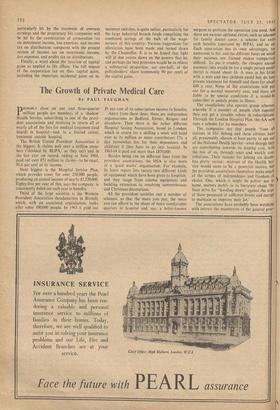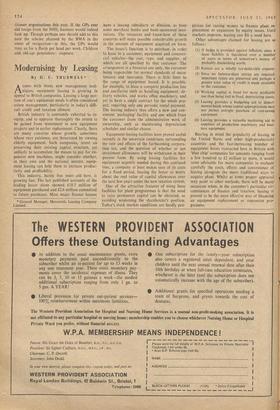The Growth of Private Medical Care
By PAUL VAUGHAN
nROBABLY close on one and three-quarter r million people are members of a 'shadow' Health Service, subscribing to one of the provi- dent associations and receiving in return all or nearly all of the fees for medical treatment (and board) in hospital—and, to a limited extent, treatment outside hospital.
The British United Provident Association is the biggest. It claims well over a million mem- bers ('shielded by BUPA,' as they say) and in the last year on record, ending in June 1964, paid out over £51 million in claims—to be exact, 91.6 per cent of its income.
Next biggest is the Hospital Service Plan, which provides cover for over 250,000 people, producing an annual income of nearly £1,250,000. Eighty-five per cent of this, says the company, is consistently doled out each year in benefits.
Third of the large societies is the Western Provident Association (headquarters in Bristol), which, with an associated organisation, looks after some 100,000 people. In 1963 it paid out 8l per cent of its subscription income in benefits.
Apart from these three, there are independent organisations in Bedford, Exeter, Reigate and elsewhere. Then there is the rather different Hospital Saving Association, based in London, which in return for a shilling a week will hand over to its million or more contributors 17s. a day (somewhat less for their dependents and children) if they have to go into hospital. In 1963-64 it paid out more than £870,000.
Besides being run on different lines from the provident associations, the HSA is also more of a 'good works' organisation. For example, its latest report lists twenty-two different kinds of equipment which have been given to hospitals, and they range from cinema equipment and building extensions to revolving summerhouses and Christmas decorations.
All the provident societies run a number of schemes, so that the more you ppy, the more you can afford in the shape of more comfortable quarters in hospital and, say, a better-known surgeon to perform the operation you need. And there are various optional extras, such as schemes for family doctor cover, a scheme for extra cash benefits (operated by WPA), and so on. Each association has its own advantages, too numerous to list, and the different bases on which their incomes are framed makes comparison difficult. To put it crudely, the cheapest annual payment (this would be for a single person under thirty) is round about £6. A man in his fifties with a wife and two children could buy de luxe private treatment for himself and them for about £40 a year. None of the associations will pal out for a normal maternity case, and there are liable to be special conditions if a would-be subscriber is unduly prone to illness.
The associations. also operate group schemes, whereby if a' number of people club together they can get a sizeable rebate in subscriptions. Through the London Hospital Plan, the AA noW runs a scheme for its members.
The companies say that people 'from all stations in life' belong and these citizens have all, presumably, chosen at least partly to opt out of the National Health Service—even though they are contributing towards its leaping cost, with the rest of us, through taxes and weekly con- tributions. Their reasons for joining are doubt- less pretty varied : mistrust of the Health Ser• vice would seem to be a powerful motive, but the provident associations themselves make much of the virtues of independence and freedom Of choice. One, which it might be politer not to name, mutters darkly in its literature' about 'fbe State drive for "levelling down" against the urge of those possessed of sufficient brains and energy to maintain or improve their lot.'
The associations have probably been watching with interest the manoeuvres of the general prae-
titioner organisations this year. If the GPs ever did resign from the NHS, business would indeed look up. Though perhaps one should add to this note the scheme planned by the BMA in the event of resignation—in this, the GPs would treat us for a florin per head per week. Children and old-age pensioners: sixpence.















































 Previous page
Previous page